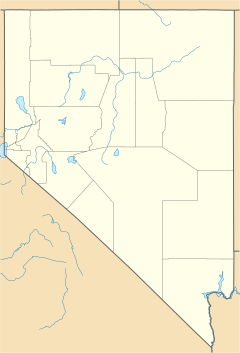Rio Tinto, Nevada facts for kids
Quick facts for kids
Rio Tinto, Nevada
|
|
|---|---|
| Country | United States |
| State | Nevada |
| County | Elko |
| Elevation | 6,050 ft (1,844 m) |
| Time zone | UTC-8 (Pacific (PST)) |
| • Summer (DST) | UTC-7 (PDT) |
Rio Tinto is a ghost town located in Elko County, Nevada, in the United States. A ghost town is a place where most people have left, and it's mostly empty.
Contents
History of Rio Tinto
Rio Tinto was one of the last "boom towns" to appear in the United States. A boom town is a community that grows very quickly because of a sudden economic opportunity, like finding valuable minerals.
How Rio Tinto Got Its Name
The town was named after famous copper mines in Andalusia, Spain. Those mines, also called Rio Tinto, had been producing copper for an amazing 3,000 years!
The Discovery of Copper
The discovery of copper near Rio Tinto, Nevada, is credited to Franklyn Hunt. He had spent many years exploring the western United States. Hunt found small signs of copper a few miles from Mountain City, Nevada. He claimed his discovery, but not many people believed him at first.
Only two brothers, Walt and Jack Davidson, had enough faith in Hunt. They decided to "grub stake" him, which means they gave him money and supplies to keep searching. For years, Hunt believed that a large amount of copper ore would be found deep underground, about 250-foot (76 m) down.
The Copper Rush Begins
In 1932, Franklyn Hunt finally found the copper he had been looking for! News of this discovery spread quickly. This started a "rush" of people to the area, all hoping to find their own fortune. This rush led to the creation of the town of Rio Tinto.
Life in the Boom Town
Unlike many other mining towns, Rio Tinto was not negatively affected by the start of World War II. The demand for copper remained high during the war. The town continued to thrive for a while.
The Decline of Rio Tinto
However, after World War II ended, things changed. The price of copper went down, and it became too expensive to keep the mine running. The mine was no longer making enough money.
By 1948, all mining operations had stopped. Without the mine, people began to leave, and Rio Tinto quickly became a ghost town. The town's post office, which had opened in 1936, closed in February 1948.
What Remains Today
After the mine closed, some cleanup was done. Many of the old buildings were moved to other places. Today, only a few houses and the old school building remain. The school is the largest building still standing in what was once a busy town.
 | Ernest Everett Just |
 | Mary Jackson |
 | Emmett Chappelle |
 | Marie Maynard Daly |



